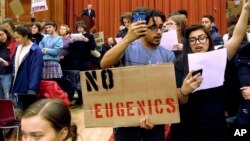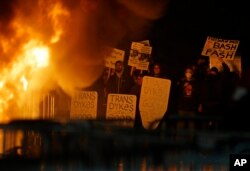American universities have long allowed controversial public figures to speak publicly as part of a philosophy that encourages open debate as a means of education. But a series of recent protests appears to indicate shifting attitudes about free speech among today's students.
Since February, protests on college campuses like the University of California-Berkeley, Middlebury College, the Claremont colleges and California State University, Los Angeles, have erupted ahead of speeches scheduled by conservative political pundits. The protests, several of which turned violent, have drawn intense media coverage and condemnation from those who believe the demonstrations are aimed at shutting down controversial speakers.
Will Creeley, senior vice president of legal and public advocacy at the Foundation for Individual Rights in Education (FIRE), told VOA the incidents have become a growing concern for free speech advocates because he thinks schools could do more to protect invited speakers.
"Capitulating to threats of violence only goes to further embolden that illiberal response," he said. "Violence at these events will beget more violence and we are seriously concerned that someone is going to get hurt."
Last month, a student group at Vermont's Middlebury College invited Charles Murray, a political scientist and fellow at the conservative American Enterprise Institute, to speak on campus. Murray's controversial research has linked race and intelligence, leading groups such as the Southern Poverty Law Center to label him a white nationalist.
Murray was greeted by hundreds of protesters who shouted over him when he tried to speak. As the crowd refused to let up, college administrators escorted Murray to another building where his talk with Middlebury professor Allison Stanger was broadcast online.
As Stanger and Murray left the building, they were "physically and violently confronted by a group of protesters," college spokesman Bill Burger said in a statement.
Protesters "set upon [their] car, rocking it, pounding on it, jumping on and trying to prevent it from leaving campus," Burger said.
Stanger was treated at a hospital emergency room and left wearing a neck brace following the confrontation with protesters, one of whom grabbed her by the hair and yanked her backward. "I feared for my life," Stanger later wrote in a post on Facebook.
Earlier this month, students at Claremont McKenna College in California targeted Heather MacDonald, a Manhattan Institute scholar and prominent critic of the Black Lives Matter movement. Students at Claremont took issue with a book MacDonald published last year called The War on Cops, which puts forth the idea that police officers are afraid to perform their jobs because of increased media scrutiny following the 2014 police shooting death of Michael Brown in Ferguson, Missouri.
MacDonald, who was also invited to speak on campus by a student group, saw protesters block the doors to the building where she was scheduled to speak. She was forced to deliver the speech via livestream to a largely empty room, as the protesters refused to allow anyone to pass.
The protesters banged on windows and shouted from outside the building until "the cops decided that things were getting too chaotic and I should stop speaking," MacDonald later said of the incident.
Police officers then had to sneak MacDonald out the building's back door so she could safely escape the protesters.
Following her speech, more than two dozen students signed an open letter to one of the school's presidents, David Oxtoby, assailing MacDonald as a "fascist" and demanding Claremont "take action" against an independent student newspaper for its coverage of the protests and its "continual perpetuation of hate speech."
Oxtoby had previously condemned the protests and defended MacDonald's right to speak on campus, citing the college's commitment to "the exercise of free speech and academic freedom."
The students argued that MacDonald is a well-known figure, with her views well-documented, so refusing her a platform to speak didn't violate her rights. Further, the students said, they consider MacDonald's mere presence on campus "a form of violence."
Attacks on Constitution
Incidents like the ones at Middlebury and Claremont have become increasingly common on American college campuses, according to Creeley.
"It's deeply troubling," he told VOA. "We have seen an unfortunate outbreak of violence in response to controversial speakers on campus."
He blamed university administrators for capitulating to student critics who he said show a lack of knowledge about laws protecting free speech in the United States.
"The Supreme Court has wisely limited the categories of unprotected speech to a narrow set of exceptions, including true threats, intimidation, incitement, and obscenity. On campus, schools that accept federal funding have a legal obligation to prohibit discriminatory harassment. But each of these exceptions has a carefully crafted legal definition," he said.
In a 2015 YouGov survey, 43 percent of students said, "Making sure that students have an environment free from discrimination, even if that means placing some limits on what students can say" should be more of a priority for colleges than protecting the "absolute right to free speech."
A similar 2016 survey conducted by Gallup shows that, by a 52 percent to 42 percent margin, students believe their institution should forbid people from speaking on campus who have a history of engaging in "hate speech."
But, as Creeley told VOA, "there is no hate speech exception to the First Amendment."
"There is an unfortunately prevalent problem of students being unaware of the extent of their rights and the rights of their peers," he said.
Birthplace of free speech
This discussion over First Amendment rights came to a head this week when the University of California-Berkeley pre-emptively cancelled a scheduled speaking event by conservative commentator Ann Coulter, citing concerns the school couldn't control a potentially violent reaction to Coulter's presence.
The cancellation followed several violent incidents on the Berkeley campus this year, including a riot in February when conservative journalist Milo Yiannopoulos was invited to speak. That incident resulted in more than $100,000 of damage to buildings on campus.
The school's decision to cancel Coulter touched off a firestorm of controversy, leading Berkeley to reverse its move and reschedule Coulter's talk at a time when less people would be on campus. This didn't sit well with the student group that invited Coulter to campus, so, on Monday, they filed a lawsuit against the school alleging discrimination against the speaker.
"This case arises from efforts by one of California's leading public universities, UC Berkeley, once known as the 'birthplace of the Free Speech Movement,' to restrict and stifle the speech of conservative students whose voices fall beyond the campus political orthodoxy," according to the lawsuit, filed by Harmeet Dhillon on behalf of the Berkeley College Republicans.
A spokeswoman for the school, Diane Klein, called the allegation that Coulter is being unfairly punished for her political point of view "untrue."
"The university welcomes speakers of all political viewpoints and is committed to providing a forum to enable Ann Coulter to speak on the Berkeley campus," she said in a statement.
The university offered to let Coulter speak May 2, but Dhillon said the time slot is unacceptable, because students will be studying for finals.





